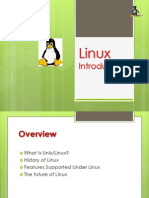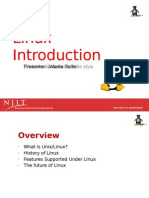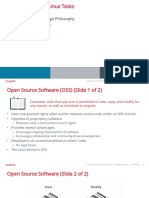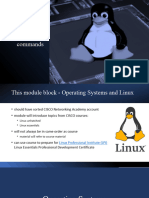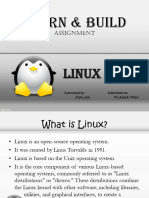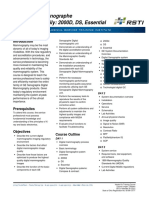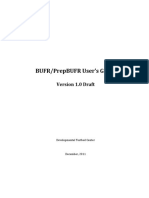There are many programs that work on Linux, ranging from basic utilities to complex
applications for various purposes. Here are some examples of different types of
programs you can use on Linux:
1. System Utilities
htop: Interactive process viewer, similar to top, but more user-friendly.
ls: List directory contents.
grep: Search for patterns within files.
find: Search for files in a directory hierarchy.
df: Displays disk space usage.
du: Estimates file space usage.
2. Text Editors
nano: A simple, easy-to-use text editor.
vim: A highly customizable text editor for code and text.
emacs: Another powerful text editor, often used for programming.
gedit: A graphical text editor (GNOME default).
VSCode: A popular code editor with many extensions for various programming
languages.
3. Programming Languages and Compilers
python: Python interpreter.
gcc: The GNU C Compiler.
java: Java Runtime Environment for running Java programs.
ruby: Ruby interpreter.
perl: Perl interpreter.
node.js: JavaScript runtime for server-side programming.
4. File Management
rsync: Remote file and directory synchronization.
tar: Archive utility for compressing files.
zip/unzip: For compressing and decompressing files.
scp: Secure file copy (via SSH).
mc (Midnight Commander): A text-based file manager for the terminal.
5. Networking
ping: Test network connectivity.
curl: Transfer data from or to a server (useful for interacting with APIs).
wget: Download files from the internet.
ssh: Securely connect to a remote machine.
netstat: Network statistics and connections.
ifconfig/ip: Network interface configuration.
6. Web Browsers
Firefox: A popular open-source web browser.
Chromium: Open-source version of Google Chrome.
Opera: Another web browser with integrated VPN and other features.
7. Multimedia
VLC: A versatile media player.
ffmpeg: A command-line tool for video and audio processing.
Audacity: Audio editing software.
Shotcut: Open-source video editing software.
GIMP: A powerful image editing tool.
Blender: 3D modeling and animation software.
8. Office Suites
LibreOffice: A free and open-source office suite (alternative to Microsoft Office).
OnlyOffice: Another office suite with cloud integration.
�9. Development Tools
Git: Version control system for tracking changes in files and collaborating on
software.
Docker: Containerization platform for developing, shipping, and running
applications.
Vagrant: Tool for building and maintaining virtualized development environments.
Jenkins: An open-source automation server for building, testing, and deploying
software.
Ansible: A configuration management tool for automating IT tasks.
10. Security and Privacy Tools
nmap: Network exploration tool and security scanner.
Wireshark: Network protocol analyzer.
gpg: GNU Privacy Guard for encryption and signing data.
fail2ban: Security tool that helps protect Linux servers from brute-force attacks.
11. Package Managers
apt (for Debian-based distros like Ubuntu): Package management system for
installing software.
dnf (for Fedora): A package manager for managing software packages.
pacman (for Arch Linux and derivatives): A package manager for installing,
updating, and removing software.
zypper (for openSUSE): A command-line interface for package management.
12. Desktop Environments and Window Managers
GNOME: A popular desktop environment for Linux.
KDE Plasma: Another popular and highly customizable desktop environment.
Xfce: A lightweight and fast desktop environment.
i3: A tiling window manager.
Openbox: A lightweight window manager for X11.
13. Virtualization
VirtualBox: Virtualization software for running guest operating systems.
QEMU: A hardware virtualization tool.
Docker: Container-based virtualization for running lightweight virtual
environments.
14. System Monitoring and Performance
glances: A system monitoring tool with a web-based interface.
sar: System Activity Reporter, provides information about CPU, memory, and network
usage.
top: Displays a dynamic view of running processes and system usage.
15. Games
Steam: Gaming platform for Linux with thousands of games.
Lutris: Open gaming platform that helps install and manage games on Linux.
PlayOnLinux: A graphical front-end for Wine, making it easier to run Windows games
on Linux.
These are just some of the many types of programs that work on Linux, depending on
your needs, whether you're a developer, gamer, or sysadmin, Linux has a wide range
of tools for every purpose. Let me know if you'd like more information about any
specific program!







